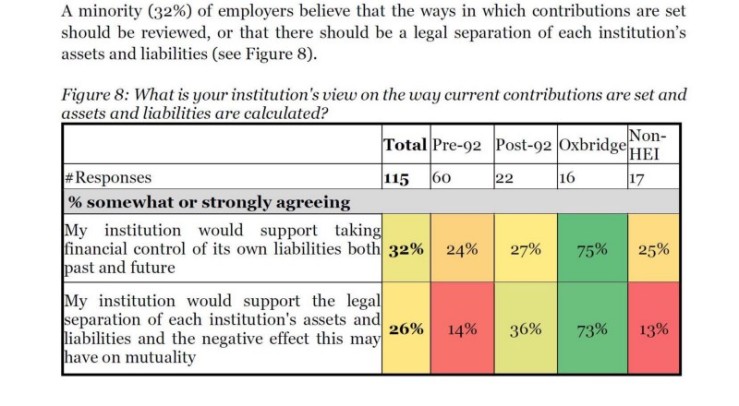This article is resyndicated from Medium.com.
To be more precise: what follows is an account of the role of these two universities, and their constituent colleges, in the demise of USS as a multi-employer scheme that promises a decent, defined benefit (DB) pension to its members. In the past, this promise has been generous and affordable, owing to the risk pooling across 68 well-established UK universities that the last-man-standing mutuality of the scheme makes possible. It is clear, however, that Oxford and Cambridge now want out of such a DB scheme. The clarity of this desire is revealed in the following figure:

It is striking that 73% of “Oxbridge” institutions — which must include constituent colleges as well as the universities — oppose the mutuality of USS’s last-man-standing arrangement, as compared with only 14% of all other USS universities (designated ‘Pre-92’).
They want out on grounds that last man standing exposes them to too much risk arising from “weaker” universities. In their submission to the September consultation, Oxford writes that “the level of risk being proposed is not appropriate for all institutions and allowing weaker institutions to rely on the strength of other employers in a manner which makes their pension benefits appear affordable must be addressed”. They conclude that a “DC-only structure…would help reduce the University’s concern regarding underwriting the risk of future benefit accrual for other institutions”.
In their submission to the September consultation, Cambridge objects that:
The University (and the other financially stronger institutions) continues to lend its balance sheet to the sector, which contains the cost of pension provision for all employers. In a competitive market for research and student places the University would be concerned if this appeared to be having an adverse effect on the University’s competitiveness (by allowing competitor universities access to investment financing or reducing their PPF costs in a way that would not be possible on a stand-alone basis).
Although this may strike some as an uncollegial, dog-eat-dog attitude towards their academic peers, Cambridge assures us that this is in the service of the greater good of society: “the University wishes to protect the long term health of the University as a major asset to the UK economy”.
